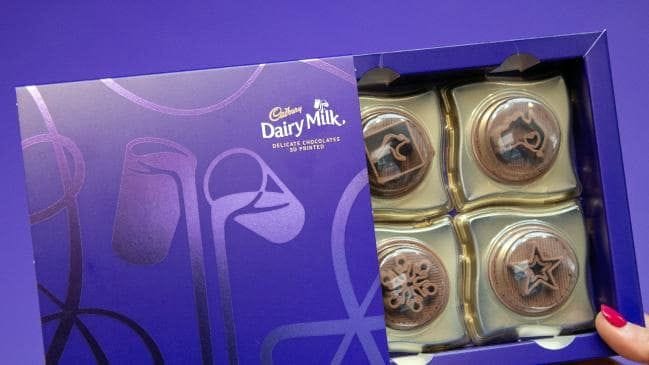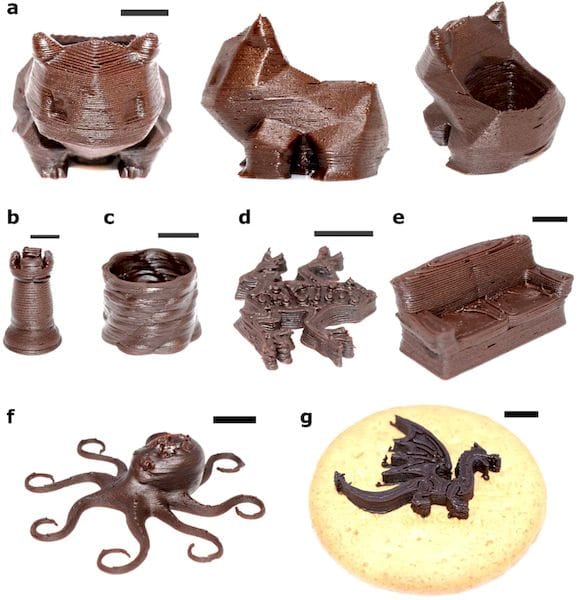![3D printed chocolates [Source: Cadbury]](https://fabbaloo.com/wp-content/uploads/2020/05/image-asset_img_5eb0941476844.jpg)
I’m reading an announcement that this past Sunday a new chocolate 3D printer was unveiled.
The device was launched by Cadbury in Australia, one of the world’s largest distributors of chocolate, that heavenly substance that so many of us enjoy.
News.com.au said:
“Sunday, July 7, marks an auspicious and highly regarded celebration — World Chocolate Day.
To honour said special occasion, Cadbury will be launching the World’s First Cadbury Dairy Milk 3D Printer and treating Melburnians to something fun, delicious and highly Instagrammable.
Cadbury will offer chocolate-lovers the chance to be among the first to take away their very own personal selection of 3D printed chocolate pieces built from layer upon layer of delicious Cadbury Dairy milk chocolate.”
Well. I have a few things to say about this development.
![Chocolates being 3D printed by Cadbury? [Source: Cadbury via News.com.au]](https://fabbaloo.com/wp-content/uploads/2020/05/image-asset_img_5eb09414da708.jpg)
I cannot find any imagery or information about the chocolate 3D printer anywhere, aside from some tasty shots of chocolates that have apparently been printed on this device. There are no specifications, pricing or even a hint they might be marketing or even using this device in the future. It seems that Cadbury is not particularly interested in marketing this device as it appears to be a one-off item simply for this event.
What’s disturbing to me is that this is billed by media as a “World’s First” when in terms of chocolate 3D printing in fact it clearly is not. People (though until now not Cadbury) have been fiddling with chocolate 3D printers for many years.
![3D printed chocolates by Cadbury [Source: Cadbury via News.com.au]](https://fabbaloo.com/wp-content/uploads/2020/05/image-asset_img_5eb094152e0dc.jpg)
First Chocolate 3D Printer
Our first story on chocolate 3D printing was from way back in 2012, when the ChocEdge 3D printer was announced. We’ve seen this device in person a few times, and it definitely works. We actually have a sample chocolate print of our logo still here in the office somewhere.
Since 2012, ChocEdge has released a couple of different versions of their device, now currently selling the Choc Creator V2.0 Plus at a price of £1,490 (US$1,865).
3D printing chocolate is an incredibly complex process to achieve, as there are two challenges not faced by other 3D printing materials.
Chocolate For 3D Printing
First, chocolate is a terrible structural material. It has very little strength and if you try to 3D print anything very tall it will likely begin to slump under its own weight. This is why you almost never see any larger chocolate 3D prints. Anything even slightly big has no doubt had significant and careful tuning of temperatures to succeed.
Secondly, chocolate must be eaten! Therefore taste must also be accounted for, and it is a very challenging matter, even for normal non-3D printing chefs. The taste depends on holding the material at a very precise temperature and rate of cooling, which is nearly impossible to achieve in a 3D printing environment. This is why I quite admire ChocEdge for their achievement.
Meanwhile, Cadbury says:
“In a world premiere, CADBURY DAIRY MILK launched the very first CADBURY DAIRY MILK milk chocolate 3D Printer, in celebration of World Chocolate Day on July 7, 2019.”
So technically they are correct, this would be the very first “CADBURY DAIRY MILK milk chocolate 3D Printer”. It is a very specific world’s first, though, and that specificying makes all the difference; read carefully when the media claims some novel “first.”
Via Cadbury Australia and News.com.au











A major chocolate maker announced a new chocolate 3D print service, but there’s a slight catch.